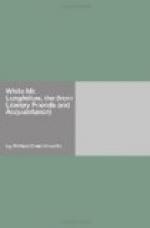It was the moment before the old American customs had been changed by European influences among people of easier circumstances; and in Cambridge society kept what was best of its village traditions, and chose to keep them in the full knowledge of different things. Nearly every one had been abroad; and nearly every one had acquired the taste for olives without losing a relish for native sauces; through the intellectual life there was an entire democracy, and I do not believe that since the capitalistic era began there was ever a community in which money counted for less. There was little show of what money could buy; I remember but one private carriage (naturally, a publisher’s); and there was not one livery, except a livery in the larger sense kept by the stableman Pike, who made us pay now a quarter and now a half dollar for a seat in his carriages, according as he lost or gathered courage for the charge. We thought him extortionate, and we mostly walked through snow and mud of amazing depth and thickness.
The reader will imagine how acceptable this circumstance was to a young literary man beginning life with a fully mortgaged house and a salary of untried elasticity. If there were distinctions made in Cambridge they were not against literature, and we found ourselves in the midst of a charming society, indifferent, apparently, to all questions but those of the higher education which comes so largely by nature. That is to say, in the Cambridge of that day (and, I dare say, of this) a mind cultivated in some sort was essential, and after that came civil manners, and the willingness and ability to be agreeable and interesting; but the question of riches or poverty did not enter. Even the question of family, which is of so great concern in New England, was in abeyance. Perhaps it was taken for granted that every one in Old Cambridge society must be of good family, or he could not be there; perhaps his mere residence tacitly ennobled him; certainly his acceptance was an informal patent of gentility. To my mind, the structure of society was almost ideal, and until we have a perfectly socialized condition of things I do not believe we shall ever have a more perfect society. The instincts which governed it were not such as can arise from the sordid competition of interests; they flowed from a devotion to letters, and from a self-sacrifice in material things which I can give no better notion of than by saying that the outlay of the richest college magnate seemed to be graduated to the income of the poorest.
In those days, the men whose names have given splendor to Cambridge were still living there. I shall forget some of them in the alphabetical enumeration of Louis Agassiz, Francis J. Child, Richard Henry Dana, Jun., John Fiske, Dr. Asa Gray, the family of the Jameses, father and sons, Lowell, Longfellow, Charles Eliot Norton, Dr. John G. Palfrey, James Pierce, Dr. Peabody, Professor Parsons, Professor Sophocles. The variety of talents and of achievements was indeed




